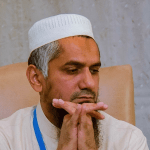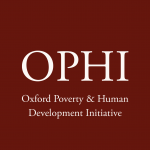Monday, February 22, 2021
10:00 a.m. – 11:15 a.m.
via Webex
Most poverty measures identify a household as poor or non-poor based on the achievements of all its members. Using the household as the unit of identification enables a poverty measure to draw on information from persons of different ages, genders, and life situations, but loses individual information by summarising it at the level of the household. As a consequence, gendered and intrahousehold inequalities are not illuminated even when data for them exist. However individual indicators or indices lose information regarding the achievements of other household members, and face challenges in finding a structure by which to compare all genders and ages. This paper augments a household multidimensional poverty index (MPI) by applying individual-level analyses to individual indicators in that MPI, and analysing individual deprivations alongside the matrix of deprivations underlying an MPI. Here we focus on individually undernourished and out of school children. Analyses show what proportion of deprived (and poor) children i) live in multidimensionally poor households; ii) are girls vs boys; iii) live in households in which other eligible children are not deprived in that indicator. We also observe iv) what additional deprivations children experience besides the focal deprivation, and v) what proportion of people live in households where children of different ages experience different age-specific deprivations concurrently. Finally using data on completed years of schooling for all adults and children vi) we identify ‘pioneer children’, to illustrate the possibility of combining information on the deprivation or attainment status of more than one household members. This paper provides a prototype methodology that can be incorporated into standard analyses of household poverty measures that include individual indicators in order to shine a light jointly on individual and household poverty. We illustrate each aspect of the methodology with analyses of the global Multidimensional Poverty Index (MPI) for seven countries in South Asia.
About the Presenter:
 Rizwan Ul Haq is a Research Associate at OPHI. He is also Assistant Professor of Development Studies at the Pakistan Institute of Development Economics where he is Head of the Department of Development Studies. He has more than 18 years of experience in population and development mainly focusing on poverty, ageing and health. He has worked in the United Nations Development Programme in the preparation of National Human Development Report for Pakistan on Youth.
Rizwan Ul Haq is a Research Associate at OPHI. He is also Assistant Professor of Development Studies at the Pakistan Institute of Development Economics where he is Head of the Department of Development Studies. He has more than 18 years of experience in population and development mainly focusing on poverty, ageing and health. He has worked in the United Nations Development Programme in the preparation of National Human Development Report for Pakistan on Youth.
About the Discussants:
 Cheryl Doss is a development economist whose research focuses on issues related to assets, agriculture and gender with a regional focus on sub-Saharan Africa. Among her research projects, she co-leads the Gender Asset Gap Project, a large-scale effort to collect data and measure individual asset and wealth holdings for men and women in Ecuador, Ghana, and Karnataka, India. This research examines best practices for collecting individual data on assets and also quantifies women’s ownership of and control over productive assets. Currently, much of her work focuses on how to understand both joint and individual ownership and decision-making within rural households. Cheryl Doss works with a range of international organizations on issues including best approaches for collecting sex-disaggregated data, gender and agriculture, intrahousehold resource allocation, and women’s asset ownership. Currently, she is the gender advisor for the CGIAR Research Program on Policies, Institutions, and Markets led by the International Food Policy Research Institute (IFPRI). In recent years, she has also worked with UN Women, the UN Food and Agriculture Organization, the Bill and Melinda Gates Foundation, the World Bank, DFID, the Africa Development Bank, and the UN Foundation on issues of women’s asset ownership. She has published widely in academic journals in economics, agricultural economics, and development studies.
Cheryl Doss is a development economist whose research focuses on issues related to assets, agriculture and gender with a regional focus on sub-Saharan Africa. Among her research projects, she co-leads the Gender Asset Gap Project, a large-scale effort to collect data and measure individual asset and wealth holdings for men and women in Ecuador, Ghana, and Karnataka, India. This research examines best practices for collecting individual data on assets and also quantifies women’s ownership of and control over productive assets. Currently, much of her work focuses on how to understand both joint and individual ownership and decision-making within rural households. Cheryl Doss works with a range of international organizations on issues including best approaches for collecting sex-disaggregated data, gender and agriculture, intrahousehold resource allocation, and women’s asset ownership. Currently, she is the gender advisor for the CGIAR Research Program on Policies, Institutions, and Markets led by the International Food Policy Research Institute (IFPRI). In recent years, she has also worked with UN Women, the UN Food and Agriculture Organization, the Bill and Melinda Gates Foundation, the World Bank, DFID, the Africa Development Bank, and the UN Foundation on issues of women’s asset ownership. She has published widely in academic journals in economics, agricultural economics, and development studies.
 Jeni Klugman is Managing Director at the Georgetown Institute for Women, Peace and Security and Senior Adviser at the Stanford University Center for Gender Equality. Dr Klugman’s previous positions include fellow at the Kennedy School of Government’s Women in Public Policy Program at Harvard University, Director of Gender and Development at the World Bank, and director and lead author of three global Human Development Reports published by the UNDP. She has published over a dozen books and major global reports, and (co)authored over 70 articles in peer reviewed journals. She regularly participates in major global gender policy initiatives, including the Lancet Series on Gender Equality; the Bill and Melinda Gates Foundation’s strategy on women’s economic empowerment; and the Council on Foreign Relations’ Advisory Committee on economic inclusion and global growth. She is currently a member of The Lancet Global Commission on Gender and Health; advising VicHealth, Australia to bring behavioral insights to advance gender equality; UN Women, the World Bank and partners on justice for women; the World Bank on the gender dimensions of forced displacement; and working with the UN Development Program on human mobility. Jeni holds a Ph.D. in Economics from the Australian National University and postgraduate degrees in both Law and Development Economics from the University of Oxford where she was a Rhodes Scholar. She was included in the Apolitical Inaugural List of the World’s 100 Most Influential People in Gender Policy in 2018 and in 2019.
Jeni Klugman is Managing Director at the Georgetown Institute for Women, Peace and Security and Senior Adviser at the Stanford University Center for Gender Equality. Dr Klugman’s previous positions include fellow at the Kennedy School of Government’s Women in Public Policy Program at Harvard University, Director of Gender and Development at the World Bank, and director and lead author of three global Human Development Reports published by the UNDP. She has published over a dozen books and major global reports, and (co)authored over 70 articles in peer reviewed journals. She regularly participates in major global gender policy initiatives, including the Lancet Series on Gender Equality; the Bill and Melinda Gates Foundation’s strategy on women’s economic empowerment; and the Council on Foreign Relations’ Advisory Committee on economic inclusion and global growth. She is currently a member of The Lancet Global Commission on Gender and Health; advising VicHealth, Australia to bring behavioral insights to advance gender equality; UN Women, the World Bank and partners on justice for women; the World Bank on the gender dimensions of forced displacement; and working with the UN Development Program on human mobility. Jeni holds a Ph.D. in Economics from the Australian National University and postgraduate degrees in both Law and Development Economics from the University of Oxford where she was a Rhodes Scholar. She was included in the Apolitical Inaugural List of the World’s 100 Most Influential People in Gender Policy in 2018 and in 2019.

